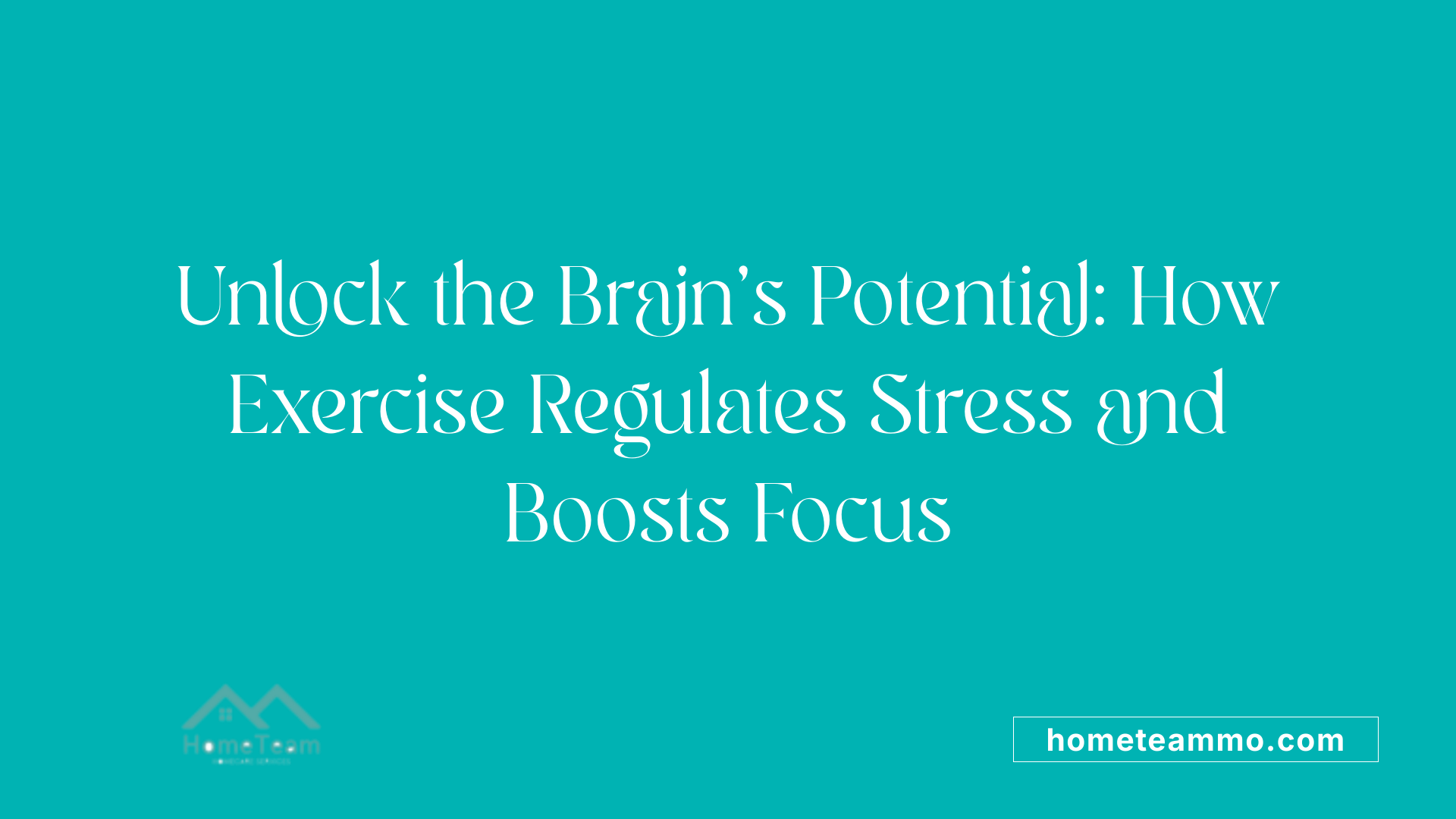The impact of exercise on reducing anxiety and improving focus
Boosting Mental Clarity and Calmness with Physical Activity

Understanding the Link Between Exercise, Anxiety, and Focus
Exercise plays a vital role in managing anxiety and enhancing cognitive focus by influencing brain chemistry, hormonal responses, and psychological resilience. This article explores the mechanisms behind these benefits, supported by scientific research, and offers practical guidance on integrating exercise into mental health strategies.
Physiological Mechanisms of Exercise Impact on Anxiety and Focus

How does exercise reduce anxiety and improve focus?
Exercise triggers a series of physiological responses that help diminish anxiety and sharpen mental focus. One of the primary mechanisms involves regulation of the hypothalamic-pituitary-adrenal (HPA) axis. This axis controls stress response systems in the body, and regular physical activity helps lower its reactivity. By doing so, exercise reduces the body's overall stress levels, making individuals less reactive to anxiety-provoking stimuli.
Simultaneously, exercise prompts neurochemical changes that positively influence mood and cognitive functions. It stimulates the release of neurotransmitters such as serotonin, dopamine, and endocannabinoids, which are known to elevate mood, produce feelings of well-being, and aid concentration.
Moreover, engaging in physical activity elevates levels of brain-derived neurotrophic factor (BDNF). BDNF plays a crucial role in supporting neurogenesis—the growth of new neurons—especially in the hippocampus, a brain region heavily involved in mood regulation and memory. Increased neurogenesis enhances brain plasticity, resilience to stress, and cognitive capabilities.
Another benefit is the reduction of stress hormones like cortisol and adrenaline. Exercise helps normalize these levels, decreasing physical symptoms of stress and anxiety.
In summary, regular exercise improves mental health and focus by calming stress responses, elevating mood-related neurochemicals, promoting brain growth, and reducing stress hormones. These combined effects make exercise a powerful tool for managing anxiety and boosting cognitive function.
Psychological and Behavioral Benefits of Exercise

What are the mental health benefits of exercise?
Regular physical activity offers numerous psychological advantages that significantly enhance mental well-being. Engaging in consistent exercise has been shown to boost self-esteem by fostering feelings of accomplishment and mastery. This sense of achievement contributes to a more positive self-image and confidence.
Exercise also promotes self-efficacy, the belief in one’s ability to manage stress and overcome challenges. This psychological reinforcement helps individuals feel more in control of their emotional health.
One notable benefit is the distraction from stressors and negative thoughts. Physical activity provides a mental 'time out,' allowing the mind to shift focus away from worries and anxieties. This 'distraction' effect can produce a calming influence, reducing overall stress levels.
In addition, incorporating mindfulness practices with exercise, such as paying attention to breath, body movement, or sensations during activity, can further enhance mental clarity. These mindful approaches help regulate emotions and promote a state of presence and relaxation.
Overall, these psychological shifts contribute to improved mood, a more optimistic outlook, and greater resilience against mental health challenges. Regular exercise is thus a valuable tool for promoting mental health, reducing symptoms of anxiety and depression, and cultivating emotional stability.
The Role of Different Types of Exercise in Anxiety Reduction and Focus Enhancement

How do different types of exercise affect anxiety reduction and focus?
Various forms of exercise offer unique benefits that help alleviate anxiety and improve mental focus. Aerobic activities, such as running, cycling, brisk walking, and swimming, are especially effective at lowering stress hormones like cortisol and adrenaline. These exercises increase blood flow to the brain and stimulate the release of chemicals like serotonin and endorphins, which uplift mood and create a calming effect.
Incorporating mind-body practices like yoga and meditation further enhances mental health. Yoga combines physical postures with breathing exercises that activate the parasympathetic nervous system, promoting relaxation and reducing physical tension that often accompanies anxiety. Similarly, meditation helps slow the heart rate, lower blood pressure, and foster mindfulness, which increases concentration and mental clarity.
Strength training, including resistance exercises and lighter physically engaging activities such as gardening, stretching, or light household chores, also contribute to mental well-being. These activities help build self-esteem and a sense of mastery, bolstering resilience against stress and supporting psychological stability.
Engaging in outdoor activities, especially walking in nature, amplifies mood benefits. Exposure to natural environments not only reduces tension and fatigue but also fosters a sense of connection with surroundings, which can further diminish feelings of anxiety and improve focus.
Research supports the notion that combining these various exercise types offers the most comprehensive approach to mental health, offering both physiological calming effects and psychological empowerment.
Neurochemical and Hormonal Responses Supporting Mental Health

How do endorphins released during exercise affect mental health?
Endorphins are neurotransmitters produced naturally in the brain during physical activity. They function as the body's natural painkillers and mood elevators, helping to combat feelings of anxiety and depression. When you exercise, especially during activities like running or aerobic workouts, your body releases endorphins that produce a sense of well-being and reduced stress.
This neurochemical cascade also influences other mood-related chemicals, notably serotonin and dopamine. Increased levels of these brain chemicals enhance mood, improve focus, and promote emotional stability. Regular exercise helps sustain endorphin activity over time, which can contribute to enduring mental health benefits.
Moreover, these hormonal responses promote resilience against stress, making it easier to cope with daily challenges. The continuous release of endorphins, combined with balanced neurotransmitter regulation, supports overall mental resilience, mood regulation, and an improved quality of life.
Exercise as a Strategy for Mental Health Conditions

How does physical activity influence mental health conditions like depression and ADHD?
Engaging in regular physical activity has proven benefits for various mental health issues such as depression and attention-deficit/hyperactivity disorder (ADHD). Exercise helps alleviate depressive symptoms by increasing mood-related neurochemicals like serotonin, dopamine, and endorphins, which act as natural mood lifters. It also promotes sleep quality, reduces inflammation, and boosts energy, all of which contribute to overall emotional well-being.
For individuals with ADHD, physical activity improves concentration, cognitive function, and self-regulation. Aerobic exercises and yoga, in particular, support neuroplasticity by stimulating the production of brain-derived neurotrophic factor (BDNF), which facilitates neuronal growth and enhances resilience against mental health stressors.
Physiologically, exercise modulates the stress response system—the hypothalamic-pituitary-adrenal (HPA) axis—by lowering reactivity, thus reducing anxiety and emotional volatility. It also encourages neurogenesis, especially in the hippocampus, an area critical for mood and memory regulation.
Psychologically, physical activity builds self-esteem, increases a sense of mastery, and provides distraction from negative thoughts. These effects are complemented by improved self-efficacy, helping individuals better cope with their symptoms.
In summary, the comprehensive impact of exercise—regulating stress pathways, enhancing neuroplasticity, and improving self-perception—makes it an effective adjunct treatment for depression and ADHD. Its ability to influence brain chemistry and bolster resilience supports mental health management alongside other therapies.
Empirical Evidence Supporting Exercise for Anxiety and Focus
What scientific evidence supports the impact of exercise on anxiety and cognitive focus?
Numerous scientific investigations, including meta-analyses and randomized controlled trials (RCTs), demonstrate that exercise significantly reduces anxiety symptoms and boosts mental focus. Meta-analyses pooling data from multiple studies report moderate effect sizes, such as -0.55 for anxiety reduction, indicating a meaningful benefit.
RCTs provide strong evidence, showing that both short bouts of activity—like 10-minute brisk walks—and longer exercise programs contribute to improvements in mood, anxiety, and cognitive function. For example, studies have found that engaging in aerobic exercise increases levels of neurochemicals such as serotonin, GABA, and brain-derived neurotrophic factor (BDNF), all of which help alleviate anxiety and promote neural plasticity.
Research also indicates that exercise enhances activity in brain regions responsible for executive functions, such as planning and working memory. These functions are supported by neurochemical changes and neurogenesis, especially in the hippocampus.
The benefits are consistent across different populations, including college students, adults with anxiety disorders, and older adults. Even a single session of moderate exercise can produce notable mood and focus improvements, with some effects lasting up to two hours. Longer engagement in physical activity not only sustains these benefits but also facilitates structural brain changes that improve memory, concentration, and overall mental clarity.
Overall, the synthesis of evidence from various rigorous studies underpins exercise's vital role in reducing anxiety and enhancing cognitive focus, making it a recommended component of mental health strategies.
Integrating Exercise into Mental Health Strategies
Building a regular exercise routine is a practical approach to managing anxiety and improving focus. Experts recommend aiming for at least 150 minutes of moderate-intensity activities, such as brisk walking, cycling, or yoga, weekly. Breaking this into smaller, manageable sessions—like a 10-minute walk—can provide immediate stress relief and help establish a consistent habit.
In addition to choosing enjoyable activities to boost motivation and adherence, incorporating brief physical activities throughout the day can have a positive impact on anxiety levels. These short bouts of exercise act as quick mental resets, reducing tension and promoting relaxation.
Pairing physical activity with relaxation techniques significantly enhances mental health benefits. Methods such as deep breathing, visualization, and mindfulness exercises can be combined with movement to deepen relaxation and improve concentration.
Creating a routine helps establish stability and predictability, which is beneficial for mental well-being. Professionals suggest starting with lower intensity exercises and gradually increasing effort as confidence and physical capacity grow.
Seeking guidance from healthcare providers or fitness experts can ensure exercises are appropriate and effectively target anxiety symptoms. Engaging social support—exercising with friends or in groups—can increase motivation and provide additional emotional benefits.
In summary, integrating regular, enjoyable physical activity with relaxation strategies, maintaining consistency, and seeking support are key steps for using exercise to enhance mental health and focus.
Harnessing Exercise for Mental Resilience and Focus
The evidence underscores the profound impact of regular physical activity on reducing anxiety and sharpening focus. By affecting neurochemical pathways, hormonal responses, and psychological factors, exercise bolsters emotional resilience and fosters mental clarity. Incorporating diverse exercise modalities along with relaxation techniques creates a comprehensive strategy for mental well-being. Adopting consistent routines, enjoying activities, and leveraging scientific insights can help individuals harness the full mental health benefits of exercise, leading to a more balanced and focused life.
References
- Effects of Exercise and Physical Activity on Anxiety - PMC
- Exercising to Relax - Harvard Health Publishing
- How Exercise Can Help Reduce Your Anxiety | Henry Ford Health
- Exploring exercise as an avenue for the treatment of anxiety disorders
- The effects of physical exercise on anxiety symptoms of college ...
- Can exercise help treat anxiety? - Harvard Health
- How Does Exercise Improve Mental Health? - HelpGuide.org

The Role of Positive Reinforcement in Senior Care at Home

The Importance of Light Housekeeping in Senior Well-being

The Role of Aromatherapy in Promoting Relaxation for Seniors

The role of cultural sensitivity in providing effective ABA therapy

How In-Home Care Services Can Ease the Transition from Hospital to Home

